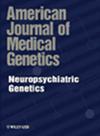Multi-polygenic scores in psychiatry: from disorder-specific to transdiagnostic perspectives
IF 1.6
3区 医学
Q3 GENETICS & HEREDITY
American Journal of Medical Genetics Part B: Neuropsychiatric Genetics
Pub Date : 2022-05-31
DOI:10.1101/2022.05.30.22275563
引用次数: 1
Abstract
The dense co-occurrence of psychiatric disorders questions the categorical classification tradition and motivates efforts to establish dimensional constructs with neurobiological foundations that transcend diagnostic boundaries. In this study, we examined the genetic liability for eight major psychiatric disorder phenotypes under both a disorder-specific and a transdiagnostic framework. In a deeply-phenotyped sample (n=513) consisting of 452 patients from tertiary care with mood disorders, anxiety disorders, attention-deficit/hyperactivity disorder (ADHD), autism spectrum disorders (ASD), and/or substance use disorders (SUD) and 61 unaffected comparison individuals, we derived subject-specific multi-base polygenic risk score (PRS) profiles and assessed their associations with psychiatric diagnoses, comorbidity status, as well as cross-disorder behavioral dimensions. High PRS for depression was unselectively associated with the diagnosis of SUD, ADHD, anxiety disorders, mood disorders, and the comorbidities among them. In the dimensional approach, four distinct functional domains were uncovered, namely the negative valence, social, cognitive, and regulatory systems, closely matching the major functional domains proposed by the Research Domain Criteria (RDoC) framework. Critically, the genetic predisposition for depression was selectively reflected in the functional aspect of negative valence systems but not others. This study highlights a misalignment between current psychiatric nosology and the underlying psychiatric genetic etiology, and underscores the effectiveness of the dimensional approach in both the functional characterization of psychiatric patients and the delineation of the genetic liability for psychiatric disorders.精神病学中的多基因评分:从疾病特异性到跨诊断视角
精神疾病的密集共存对分类分类传统提出了质疑,并促使人们努力建立超越诊断界限的神经生物学基础的维度结构。在这项研究中,我们在疾病特异性和跨诊断框架下检查了八种主要精神疾病表型的遗传倾向性。在一个深度表型样本(n=513)中,包括452名来自三级保健的患有情绪障碍、焦虑症、注意缺陷/多动障碍(ADHD)、自闭症谱系障碍(ASD)和/或物质使用障碍(SUD)的患者和61名未受影响的对照个体,我们得出了受试者特异性多碱基多基因风险评分(PRS)概况,并评估了它们与精神病学诊断、共病状态以及跨障碍行为维度的关联。抑郁症的高PRS与SUD、ADHD、焦虑症、心境障碍及其合并症的诊断无选择性相关。在维度方法中,发现了四个不同的功能域,即负价系统、社会系统、认知系统和调节系统,与研究领域标准(RDoC)框架提出的主要功能域密切匹配。关键的是,抑郁症的遗传易感性选择性地反映在负价系统的功能方面,而不是其他方面。本研究强调了当前精神病学分类学和潜在的精神病学遗传病因之间的不一致,并强调了维度方法在精神病人的功能特征和精神疾病遗传责任描述方面的有效性。
本文章由计算机程序翻译,如有差异,请以英文原文为准。
求助全文
约1分钟内获得全文
求助全文
来源期刊
CiteScore
5.90
自引率
7.10%
发文量
40
审稿时长
4-8 weeks
期刊介绍:
Neuropsychiatric Genetics, Part B of the American Journal of Medical Genetics (AJMG) , provides a forum for experimental and clinical investigations of the genetic mechanisms underlying neurologic and psychiatric disorders. It is a resource for novel genetics studies of the heritable nature of psychiatric and other nervous system disorders, characterized at the molecular, cellular or behavior levels. Neuropsychiatric Genetics publishes eight times per year.

 求助内容:
求助内容: 应助结果提醒方式:
应助结果提醒方式:


